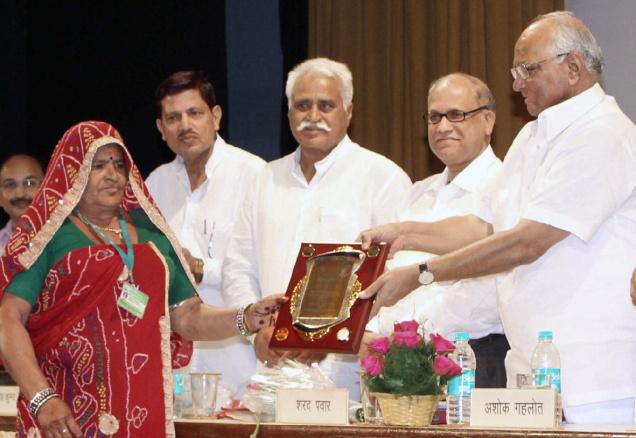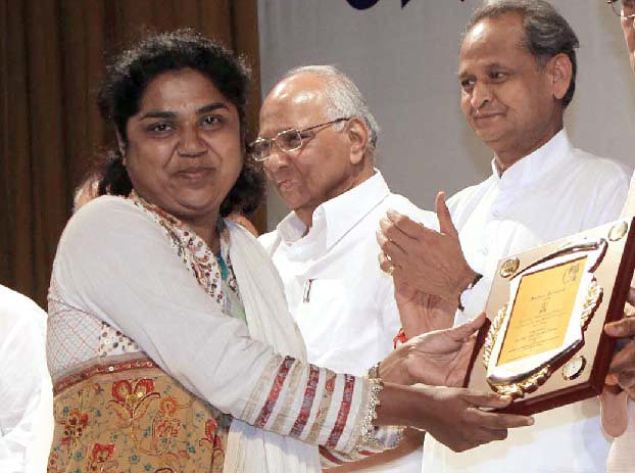Women farmers shine: Bhagwati Devi, honoured for innovative farming by Union Agriculture Minister Sharad Pawar and Rajasthan Chief Minister Ashok Gehlot. WFS
Laxmi Lokur
Three women farmers were recently felicitated for their scientific approach and acumen.
Laxmi Lokur is 38 and single. “I have no time for marriage,” she says, before moving on to her favourite subject, agriculture, and all the projects she has undertaken to attract youngsters to the field, quite literally.
Laxmi is from Karnataka’s Belgaum district and lives on her 22-acre farm. With her team of eight, which includes three women, she grows organic vegetables and fruits. Her focus is more on sowing, planning marketing networks and utilisation of the by-products of vegetables. She also runs a dairy.
Like Laxmi, Teilang Rani, 30, is also passionate about the land. Although a teacher by profession, she spends about four hours a day in the fields. Her family owns 11 acres in the village of Umden Arka, in Meghalaya’s Ri Bhoi district, on which she and her grandparents grow vegetables and paddy. The family cultivates bamboo on an additional acre. About a decade ago, Teilang began fermenting tender bamboo shoots to make curries, soup, pickles and chutneys, and has now developed this as a business model.
Bhagwati Devi from Sikar, in Rajasthan, has invented a way to protect crops from termites by planting a variety of wood, locally known as safedi ki lakdi.
Their love for agriculture and acumen for innovation recently fetched Laxmi, Teilang and Bhagwati national recognition. They were the only women felicitated alongside 28 other “farmer scientists” from 18 States by the Centre for International Trade in Agriculture and Agro-based Industries (CITA) and the Department of Agriculture, Rajasthan. The Union Agriculture Minister and Rajasthan’s Chief Minister were also present at the function held in Jaipur, where the women were honoured for their innovative practices and scientific research to enhance crop yields, improve seed varieties and scale up soil productivity.
For Teilang, this was only the second time she had ever ventured out of Meghalaya. She lives with her grandparents, husband, sister and an uncle. “Ours is a matrilineal society. I got married in January and my husband came to live with me. He works in a church 80 km from my village and visits me only twice a month,” she says. Teilang teaches English to students from Std V to X, but before going to school, she works for an hour in the fields.
Elaborating on her award-winning business model, she says, “We select 45-60-cm-long tender bamboo shoots for fermentation. These are stunted shoots, which are not likely to produce good quality bamboo for use in construction. The shoots are sliced and immersed in large jugs of water after their sheaths have been removed. They are kept like this for about a month when they ferment. We use this bamboo as pickle, add it to fish or pork curry and even soups.” Teilang has taken her bamboo shoot pickle to village exhibitions and other marketplaces, and makes about Rs 10,000 a year from her produce.
Laxmi, on the other hand, gave up a flourishing bag manufacturing business in Mumbai to return to farming in her native village of Udikeri, nine years ago. “I have two older sisters and a younger brother. In 2002, my father, a health inspector, fell ill. My sisters were married and my brother was busy studying. So I returned home to take care of my ailing father. But even after my father recovered, I decided to stay on. I had lived on our farm with my father since I was three, so I was naturally drawn to agriculture although I had no formal training. Since I wasn’t a particularly good student, I did not complete my graduation, but later explored the possibility of a short-term course in agriculture,” she says.
Laxmi’s family owned about seven acres when she first put her hands to the plough. “For one year, my father came to the fields with me to guide me. I started with a nursery, but we were unable to meet our day-to-day expenses. Then I bought a buffalo to sell milk. The next year, I bought four more. In 2005, I took a loan of Rs 6.4 lakh from the State Bank of India to procure 18 Murrah buffaloes from Haryana for dairy production. Simultaneously we worked on developing vermicompost. By 2006, we were selling vermicompost. Today we grow vegetables, which we supply to Bangalore and neighbouring districts. I have now developed my own marketing network.”
When she realised that seeds were getting too expensive, she started collecting local seeds. Three years on, she has been able to collect 22 varieties of local vegetable seeds. She now owns 19 acres, and has taken another three acres on lease.
She also conducts spoken English classes on weekends. “These are school-going children who come to me for vocational training. I have six boys and five girls as students. Once a month, I even train farmers in innovative farming, in making vermicompost the natural way and on using organic hybrids to increase harvests,” Laxmi says.
She now plans to register a non-governmental organisation and has already decided on the name: Prerna (inspiration). Apt indeed, seeing how she has inspired at least 20 young people over the last nine years to give up business activities and take up agriculture.
Laxmi, Teilang and Bhagwati are women with their hands on the plough and an instinct for the land. In a predominantly agrarian country like India, they can help transform the landscape.
© Women’s Feature Service
source: http://www.thehindubusinessline.com / by Renu Rakesh

